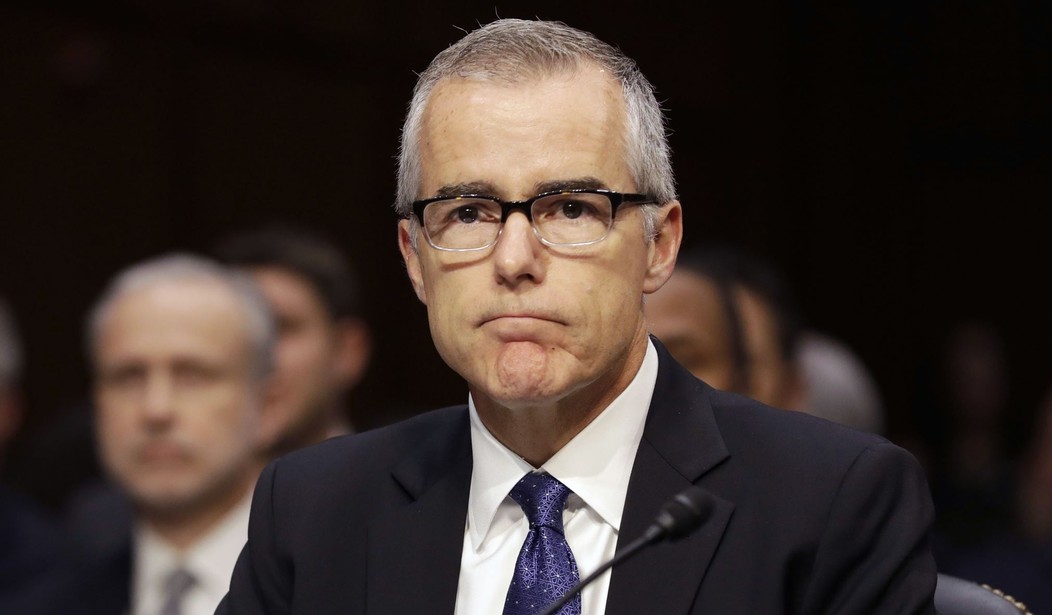In April 2018 Department of Justice Inspector General Michael Horowitz officially referred fired Deputy FBI Director Andrew McCabe for criminal prosecution. According to a report published by the IG's office, McCabe lied under oath multiple times to FBI and agents and IG investigators. In other words, he committed perjury.
We found that, in a conversation with then-Director Comey shortly after the WSJ article was published, McCabe lacked candor when he told Comey, or made statements that led Comey to believe, that McCabe had not authorized the disclosure and did not know who did. This conduct violated FBI Offense Code 2.5 (Lack of Candor – No Oath).
We also found that on May 9, 2017, when questioned under oath by FBI agents from INSD, McCabe lacked candor when he told the agents that he had not authorized the disclosure to the WSJ and did not know who did. This conduct violated FBI Offense Code 2.6 (Lack of Candor – Under Oath).
We further found that on July 28, 2017, when questioned under oath by the OIG in a recorded interview, McCabe lacked candor when he stated: (a) that he was not aware of Special Counsel having been authorized to speak to reporters around October 30 and (b) that, because he was not in Washington, D.C., on October 27 and 28, 2016, he was unable to say where Special Counsel was or what she was doing at that time. This conduct violated FBI Offense Code 2.6 (Lack of Candor – Under Oath).
We additionally found that on November 29, 2017, when questioned under oath by the OIG in a recorded interview during which he contradicted his prior statements by acknowledging that he had authorized the disclosure to the WSJ, McCabe lacked candor when he: (a) stated that he told Comey on October 31, 2016, that he had authorized the disclosure to the WSJ; (b) denied telling INSD agents on May 9 that he had not authorized the disclosure to the WSJ about the PADAG call; and (c) asserted that INSD’s questioning of him on May 9 about the October 30 WSJ article occurred at the end of an unrelated meeting when one of the INSD agents pulled him aside and asked him one or two questions about the article. This conduct violated FBI Offense Code 2.6 (Lack of Candor – Under Oath).
Recommended
Now, it looks as though a decision about whether the U.S. Attorney in Washington D.C. will indict McCabe is looming. From the New York Times:
Federal prosecutors in Washington appear to be in the final stages of deciding whether to seek an indictment of Andrew G. McCabe, the former deputy F.B.I. director and a frequent target of President Trump, on charges of lying to federal agents, according to interviews with people familiar with recent developments in the investigation.
In two meetings last week, Mr. McCabe’s lawyers met with the deputy attorney general, Jeffrey A. Rosen, who is expected to be involved in the decision about whether to prosecute, and for more than an hour with the United States attorney for the District of Columbia, Jessie K. Liu, according to a person familiar with the meetings. The person would not detail the discussions, but defense lawyers typically meet with top law enforcement officials to try to persuade them not to indict their client if they failed to get line prosecutors to drop the case.
As a reminder, CNN hired McCabe as a contributor last week.
Andrew McCabe was fired by the FBI for leaking to the media and lying to the FBI about it.
— Matt Wolking (@MattWolking) August 23, 2019
I guess crime does pay. https://t.co/sobQ4CQWgw

























Join the conversation as a VIP Member